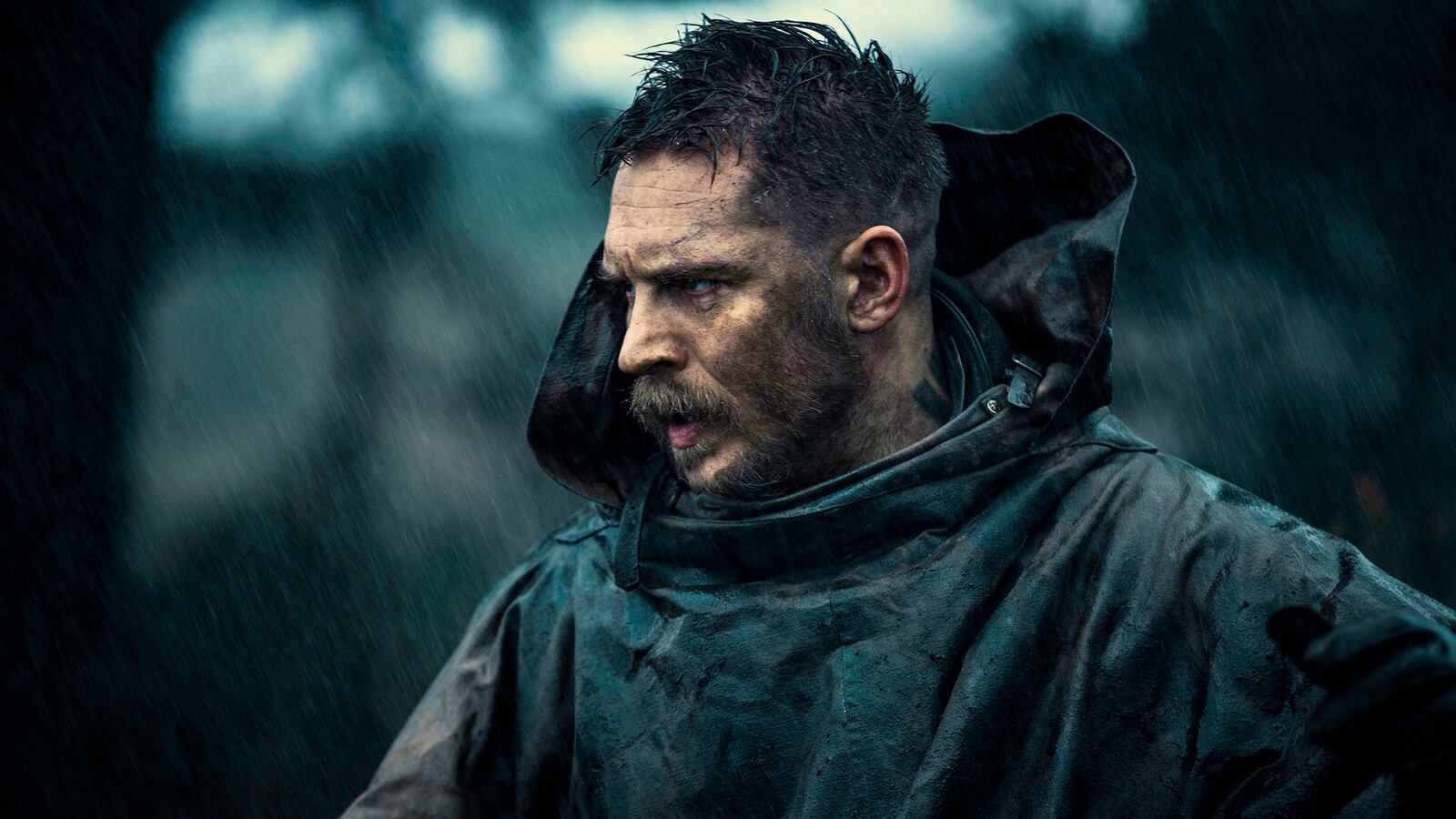James Delaney, a man forged in the hellfire of colonialism—and bearing the scars, physical and elsewhere, to prove it—is in a brothel. But, this being an FX television series and not, say, HBO or a supposed Trump jaunt to Russia, there is nary an exposed breast or golden shower to be found. There is a madam, more Fantine than Heidi Fleiss, who taunts our haunted hero with the prospect of twelve S&M-proficient men to satisfy his every whim. “People who do not know me soon come to understand that I do not have any sense,” he cautions, before threatening to castrate the whole lot, madam included.
Welcome to the grim, mysterious world of Taboo, a new 8-episode miniseries that debuted Tuesday night. It is the brainchild of father-son team Edward “Chips” Hardy and actor Tom Hardy, as well as Hardy’s Peaky Blinders collaborator Steven Knight. And, if that weren’t familial enough, it’s produced by Ridley Scott, who directed Hardy in his first-ever film, Black Hawk Down.
Hardy plays Delaney, a man who returns to London in 1814 to find his homeland at war with both France and America. Those, including his half-sister Zilpha Geary (Oona Chaplin) and trusted manservant Brace (David Hayman), thought him to be dead. But Delaney has returned from his voyage to Africa armed with tribal tattoos, a surly disposition, and a burning desire to exact vengeance on those who have wronged him—namely, his former employers at the East India Company, led by Sir Stuart Strange (Jonathan Pryce).
“As we start to unravel who he is and where he comes from, he’s had a long history of being let down by fathers—from his genuine father, to father figures, to country and civilization as a whole,” Hardy tells The Daily Beast. “There are some mythological elements there where he bears similarities to Bane.”
According to Hardy, the character of Delaney was inspired by that of Marlow in Joseph Conrad’s Heart of Darkness—whom I happen to be named after—only the inverse.
“You find out why, but he was a very wayward child who his father felt needed to be straightened out by the East India Company’s militia, so he put him in there at a very young age,” says Hardy. “The experience gave him a lot of tools and skills, but progressively put him in a really horrible situation whereby he went from the frying pan into the fire, and was lost in Africa—where he witnessed a lot of stuff and participated in a lot of stuff, which I won’t go into. His father issues get progressively worse, and he doesn’t have a mom.”
In addition to his myriad daddy issues, with Delaney fighting to retrieve his dead father’s inheritance and assume control of his business ventures, he has been badly wounded by his time under the East India Company’s thumb in Africa, a pawn in their endless pursuit of resources, power, and influence, that he’s also emerged as an agent of justice seeking to expose his ex-overlords.
“He is very much a whistleblower—a proactive whistleblower who is also well-versed in the art of war, having trained in the military academy and been in a bad situation and had to get out. He has the full gamut of abilities,” Hardy describes. “I don’t think he fears death—or he’s not constrained by any of the fear of pursuing what he believes is ethically correct and the right thing to do. He is driven for justice, but his version of justice is not as straightforward as good versus evil. He’s come to do the accounts. He’s the messenger of bad news for corrupt people.”
The character of James Delaney was conceived nine years ago by Hardy’s writer-father Chips Hardy. Co-creator Steven Knight, who also directed the younger Hardy in the excellent 2013 drama Locke, wrote the script, and has described the show’s villainous East India Company as “throughout the 19th century… the equivalent of the CIA, the NSA, and the biggest, baddest multinational corporation on earth, all rolled into one self-righteous, religiously-motivated monolith.”

Hardy echoes that assessment. “With the East India Company in our show, we’ve portrayed through individuals within the company, a far-reaching trading company that was that powerful at the time, that there were possibilities of corruption,” he says. “You hear about it all the time with lobbyists and financiers in big business where the ethical turpitude is questionable, so ultimately James Delaney is at the bottom of this massive infrastructure—in the militia/military wing of it—and because he’s a part of that infrastructure, it sort of takes one to know one. He’s of that same beast; he’s Frankenstein’s monster from the machine of this particular company.” “He’s trying to determine what’s right in a world that is grey, where big business is very profitable and there is a lot of darkness and suffering in the name of profit,” Hardy continues. “We’ve created a character who is meant to audit the accounts of the corrupt and evil, and in order to do that he’d have to have been through the system himself. It’s like a western. He could well be dead. He’s a pale rider-type who’s come back to town to audit the accounts of those who’ve sent him off to die.”
While only the first three episodes of the series have been made available to press, it is thus far a beautifully composed show boasting a ferocious turn by Hardy, who, from Bronson to Bane, has proven himself to be one of the finest actors of his generation.
And, as the body count rises and Delaney is drawn deeper and deeper into his conflict with East India (and himself), the actor promises plenty of surprises.
“As the story continues, what you’ll find is it’s not just about the man seeking revenge—actually, there are quite a lot of twists,” he says, with a devious chuckle. “And if you stick to the end episode, you’ll find that everything is not what it seems.”






